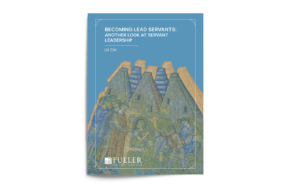August 10, 2016 • Life for Leaders
Tend the flock of God that is in your charge … not for sordid gain but eagerly…
1 Peter 5:2 (NRSV)
 I have a grandson who is learning to walk. Watching the little guy begin to crawl, stand up, and take his first steps (with parental assistance for the moment) is quite remarkable. It reminds me how walking is an astonishingly complex skill to learn, and one that requires coordination of the mind, heart and body all working together in unison. There’s no easy way to learn to do it. There are plenty of bumps and bruises along the way to success. And, even then, the possibility of stumbling and falling is ever present.
I have a grandson who is learning to walk. Watching the little guy begin to crawl, stand up, and take his first steps (with parental assistance for the moment) is quite remarkable. It reminds me how walking is an astonishingly complex skill to learn, and one that requires coordination of the mind, heart and body all working together in unison. There’s no easy way to learn to do it. There are plenty of bumps and bruises along the way to success. And, even then, the possibility of stumbling and falling is ever present.
So is learning the art of leadership. The Apostle Peter is a prime example. I’ve been reflecting on Jesus teaching on leadership in the context of Peter’s denial and subsequent restoration. The picture of Peter’s early leadership experience isn’t pretty, much like the experience of a child learning to crawl and walk. Peter isn’t held up as a great moral example to follow. Nor is his denial simply presented as a warning of what not to do. The truth, as it often is with Jesus, is more complex. We are given a real-world picture of the difficult process of becoming a “lead servant”.
Out of Peter’s experience come three sets of instructions to early followers of Jesus who were in leadership roles. Broadly speaking, they address the motivation, the mission and the method of leadership in the Way of Jesus. In my last reflection, I addressed the first – that following Jesus in leadership means doing it willingly and not under compulsion. We are to serve out of an inner freedom and not out of mere obligation or duty – even when we embrace the most difficult tasks that leadership requires.
Today, I want to focus on Peter’s second set of instructions concerning the mission or purpose of leadership. Our text says that we are to lead, not for sordid gain but eagerly. That means, in the first instance, we are not to lead and serve just for what we get out of it. When the purpose of our leadership is merely to secure our own advantage – be that money, power, status, relationships, or something else – that becomes “sordid gain”. Leadership requires a larger mission beyond our own self-interest, something that serves the common good.
It is interesting to me that Peter contrasts “sordid gain” with a word that suggests doing something with eagerness. Evidently, the way we focus on serving the common good is critical. What we focus on in our leadership is important, but how we focus on it matters even more. There needs to be an inner eagerness – even lightness – to our leadership. The gospel paradox is that the heavier our responsibility, the more lightly we must carry it.
If Peter’s first instruction is about the importance of leading freely and not compulsively, his second instruction is about leading lightly and not obsessively. In my business experience, I often found myself immersed in challenges that required my singular focus, whether on business strategy, technology development, finance decisions or personnel matters. That comes with the territory. However, focus can easily become fixation without the cultivation of a healthy, inner detachment from what we are focusing on. Ignatius of Loyola talked of developing a “holy indifference”. Of course, that’s not indifference in the sense of not caring at all about what we are doing. Rather the reverse. We care deeply enough not to have our leadership be compromised by our caring. Or, as the poet T.S. Eliot wisely said in his poem, Ash Wednesday, we need to learn how “to care and not to care.”
What we choose to care about as leaders is vital to the people and institutions we lead. So is learning how not to care. Our surrounding leadership culture makes an ultimate virtue of a leader’s commitment to his or her mission. But, Jesus reminds us that leaders are not God. We need to learn that while we have an essential role, we do not have an unlimited one. We have been given the gift of finitude. And, with finitude comes limits to our attention and energies – in other words, to our caring.
That should come as welcome relief to all of us who are in leadership. We are called as leaders to serve the common good, freely and eagerly, without the oppressive (and primal) expectation of trying to become like God. Like my grandson learning to walk, we can become leaders in the Way of Jesus with the confidence that we are loved and that we have been given the freedom to discover the richly complex vocation of being a lead servant. Even when that means we fail along the way. Just like the Apostle Peter.
QUESTIONS TO CONSIDER:
How do you see your mission in your leadership role? What is the common good that you serve? How do your own interests align or conflict with that common good?
In what ways do you struggle with leading with a sense of eagerness and lightness? What causes you to become obsessive about your leadership work? What might learning “not to care” look like for you?
PRAYER:
LORD God, we are grateful that you love us as good parents love their children. Help us to learn to trust in you as we exercise our leadership responsibilities.
Form in us the confidence to enter eagerly into the responsibilities you have entrusted to us. Help us to serve your people and your work with great passion, but also with a sense of freedom and lightness – even detachment – in the knowledge that you are God and we are not.
We ask in Jesus name, Amen.
Explore more at the Theology of Work Project online Bible commentary: 1 Peter 5
Image Credit: Learning to Walk by Tela Chhe, via CC BY 2.0.
This devotional has been updated from when it was first published on June 18, 2016.

During his adult life, Uli Chi has lived and worked in the intersection between business, the academy and the church. He has had the privilege of serving as past Board Chair of Regent College in Vancouver, BC, as current Vice Chair of the Board of the Max De Pree Leadership Center at Fuller Seminary, and as current Chair of the Executive Committee of the Center for Integrity in Business at Seattle Pacific University. He has also been involved in all aspects of local church leadership, including as a member of the adult ministries team’s teaching faculty at John Knox Presbyterian Church in Seattle.
Click here to view Uli’s profile.





Our charge begins with our immediate family. I have not done a Good Job on that horizon. BUT God has substituted His grace. If you are like me – let’s take a Father’s day pledge to be the father that God crested us to be, God Bless!!!
Thank you for your honest sharing.